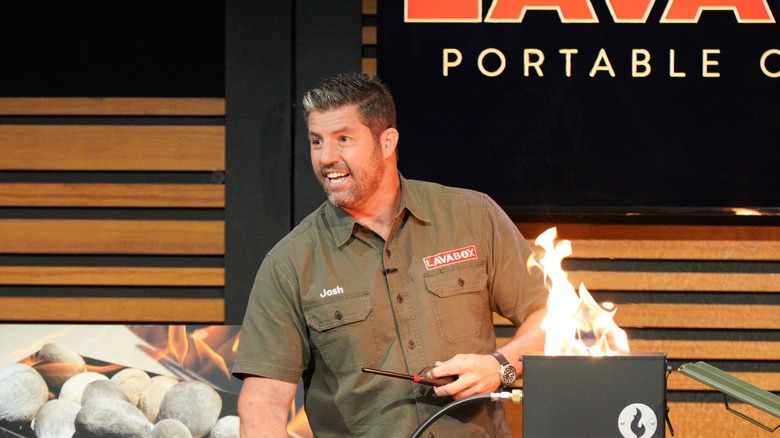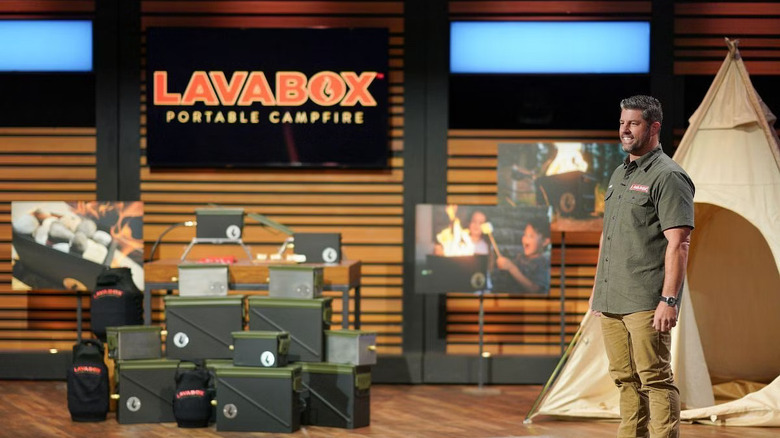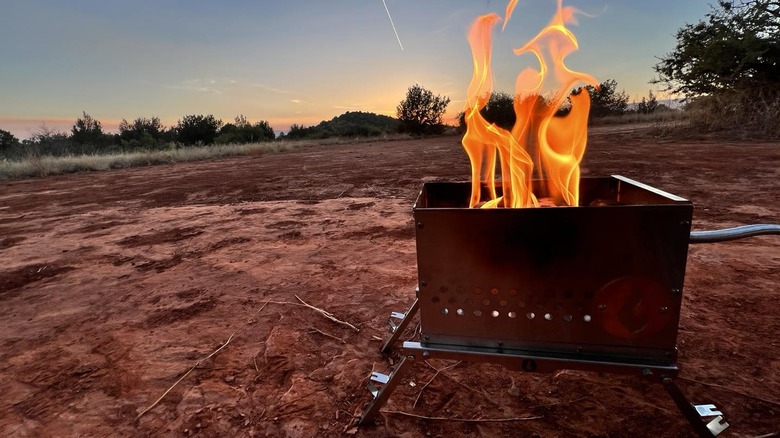What Really Came Of Lavabox From Shark Tank?
Not a year seems to go by without wildfires making the headlines, as catastrophic blazes rage across the planet causing billions of dollars worth of damage and forcing thousands of people to evacuate their homes. Images of flames rising high are a stark reminder of the climate crisis, and the devastation is borderline unbelievable. If you happen to be traveling in wildfire country, be sure to read up on the need-to-know safety tips before departure.
Experts say wildfires are becoming more common due to the effects of the climate crisis, and a dismaying statistic shows that up to 85% of blazes in the United States are caused by humans. One regular cause is campfires left unattended, a preventable problem to which Josh Thurmond of Lavabox offered a solution in Season 14 of "Shark Tank." The outdoor enthusiast, white water rafter, and self-professed tinkerer won the sharks over with his positivity and energetic pitch for his simple and safe portable campfire (similar to Radiate, another Shark Tank success story). They were equally impressed by his can-do attitude and shrewd entrepreneurship, having built his business from scratch by designing the product himself and generating good sales from word-of-mouth.
The Lavabox is appealing in its simplicity, a compact fast-lighting propane fire contained within an attractively chunky military-style ammo box container. As Thurmond demonstrated, the flame can be regulated from a gentle flicker suitable for roasting marshmallows to a roaring fire and can be adapted with a grill for cooking The product seemed like a no-brainer for an investment and Thurmond found himself with competing offers to ponder, but which shark would snap up a stake in the company?
What happened to Lavabox on Shark Tank?
"Chief Eruption Officer" Josh Thurmond of Lavabox entered the "Shark Tank" asking for $200,000 in return for a 10% slice of his "world-saving products," which for once didn't sound like an overstated claim from a hopeful entrepreneur. With a simple product, a good business plan, and impressive sales figures, Thurmond was looking for a mentor to help with future decision-making, and it didn't take long for the first shark to take a bite. Kevin "Mr. Wonderful" O'Leary offered the full amount for 20% equity, tempting Thurmond with his millions of followers.
FUBU founder Daymond John was impressed by the big-box appeal of Lavabox and matched O'Leary's offer. Thurmond was visibly saddened by the prospect of giving up 20% of his company when QVC mogul Lori Greiner came in with a different proposition. Seeing the product's potential for camping and outdoor stores, she undercut the guys with 15% equity but wanted 75 cents royalty per unit until she got her money back.
Thurmond wavered a little, asking Greiner if she would take 12% instead, with which she countered 12.5%. John obviously really wanted the deal and reduced his cut to 15% with no royalties. The negotiations were heating up and O'Leary jumped in with his own counter-offer, putting up exactly what Thurmond had initially asked for. Eventually, he took Greiner's offer, leaving the studio feeling jubilant as she was the shark he wanted to land in the first place.
Lavabox after Shark Tank
Josh Thurmond and his team at Lavabox have the balance just right. On their entertaining and informative website, their deep passion for the outdoors is infectious and their ecological concerns are matched by a sense of fun. They prove that saving the planet doesn't have to be a downer and they donate $1 of every purchase to Protect Our Rivers, a nonprofit organization dedicated to keeping the nation's natural waterways clean and healthy.
Business has been good since Lavabox's appearance on "Shark Tank," with the exposure helping the company reduce its customer acquisition costs. The Denver-based outfit works with a small team of employees and has shifted over 16,000 units to date, given away around $20,000 in donations, and is estimated to be valued around $2 million. Apart from the portable campfires (starting with the original Lavabox for $199 to a stainless steel version available for $349), a range of other products and accessories are available, including cooking utensils and merchandise (the $25 racoon tank top is a must).
Matching Thurmond's good-natured pitch, the company website features engaging regular blog posts from recipe tips to advice on environmentally-conscious camping. They also have a lively social media presence, with regular posts on their Instagram account promoting the fun and excitement of outdoor activities. If you're looking for a hack to make starting campfires a breeze (not to mention a whole lot safer), look no further than Lavabox.


